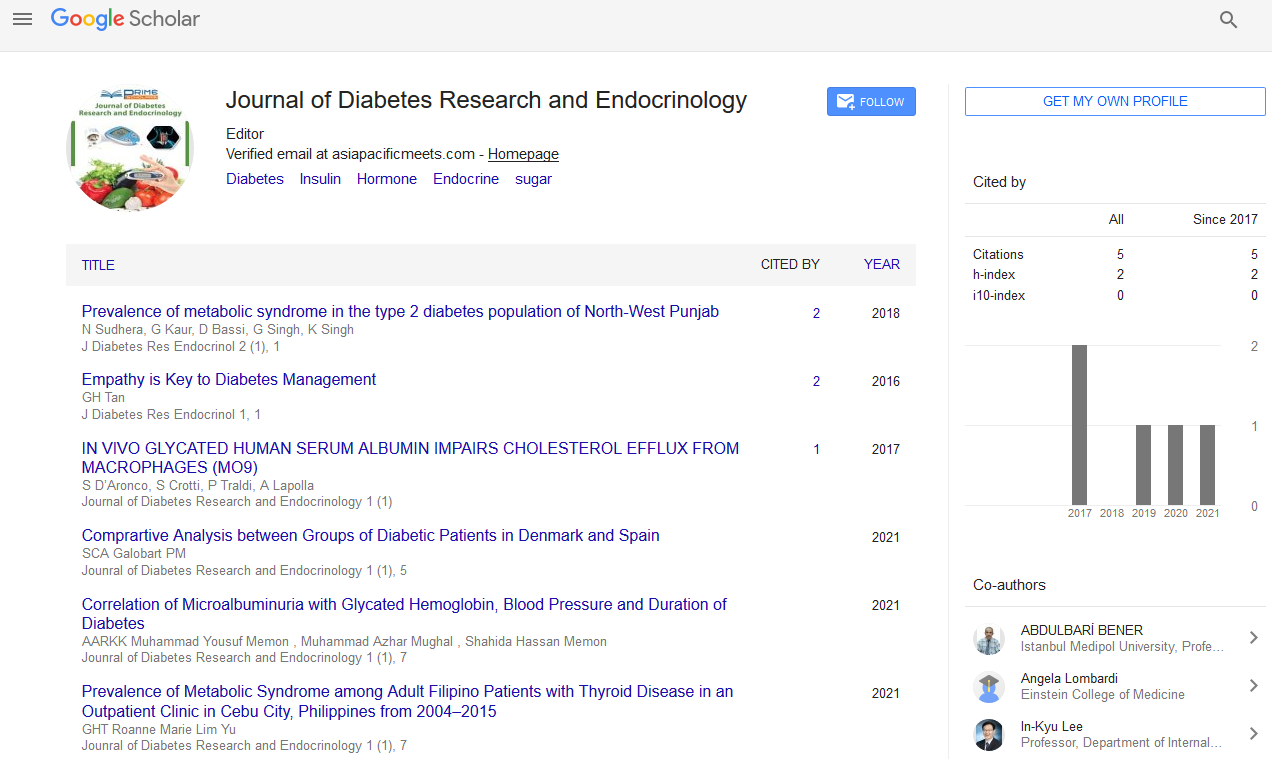Short Communication - (2023) Volume 7, Issue 1
The Majority of the Carbohydrates you Consume are the Source of
Glucose Sugar
Martina Tomasella*
Department of Food Science and Technology, National University of Singapore, Singapore
*Correspondence:
Martina Tomasella,
Department of Food Science and Technology, National University of Singapore,
Singapore,
Email:
Received: 01-Mar-2023, Manuscript No. IPJDRE-23-16291;
Editor assigned: 03-Mar-2023, Pre QC No. IPJDRE-23-16291 (PQ);
Reviewed: 17-Mar-2023, QC No. IPJDRE-23-16291;
Revised: 22-Mar-2023, Manuscript No. IPJDRE-23-16291 (R);
Published:
29-Mar-2023, DOI: 10.36648/ipjdre.7.1.06
Introduction
Hyperglycemia, or high blood sugar, can occur in diabetics.
Hyperglycemia can occur in diabetic patients for a variety of
reasons. Hyperglycemia can also be brought on by not taking
enough insulin or another medication to lower blood sugar,
missing insulin doses, or taking diabetes-unrelated medications.
The treatment of hyperglycemia is basic. Hyperglycemia
can become extreme and lead to serious medical problems
that require prompt clinical consideration, like a diabetic
unconsciousness, in the event that it isn’t dealt with. Even if
you don’t have severe hyperglycemia, it can harm your heart,
nerves, eyes, and kidneys. After that, glucose gets into the
urine, which makes people urinate more. The diabetic hyperosmolar
hyperglycaemic state can bring about perilous parchedness
and unconsciousness in the event that it isn’t dealt with.
It is essential to initiate immediate clinical consideration for it.
At the point when there is an excessive amount of sugar and
glucose in your blood, you have hyperglycemia. It’s also known
as high blood glucose or high glucose. This happens when your
body doesn’t utilize insulin appropriately nor has excessively
tad of the chemical insulin opposition [1,2].
Description
Hyperglycemia is frequently linked to diabetes, and people
with diabetes may frequently experience hyperglycemia episodes.
The majority of the carbohydrates you consume are
the source of glucose sugar. Your blood supplies glucose to all
of your body’s cells, which are then utilized for energy. Even if
you don’t have diabetes, a few big cycles usually help you keep
your blood glucose in a healthy range. Your pancreas delivers
a chemical called insulin, which is the main calculate keeping
up with sound glucose levels. Hyperglycemia can be a serious
problem if it is not treated, so treat it as soon as you notice it.
A condition known as diabetic unconsciousness, ketoacidosis,
can occur if hyperglycemia is not treated. Your body uses fats
to get energy because it can’t use glucose as fuel without insulin.
Your body will attempt to eliminate ketones through urine
because they are too much for it to handle. Due to the body’s
inability to release all of the ketones, an accumulation of ketones
in the blood can lead to ketoacidosis. The clinical ID can
provide basic information about the individual’s health status,
such as the manner in which they have diabetes, whether they
use insulin, whether they have any sensitivity, and so on, in the
event of a serious hypoglycaemic episode, an automobile accident,
or another emergency [2-4].
Conclusion
When they are really focusing on someone who is unable to
represent themselves, crisis clinical faculty are prepared to
look for a clinical ID. The state of having high blood glucose levels
is referred to as hyperglycemia. It happens when the body
doesn’t make or use enough insulin. This hormone can assist
cells in absorbing glucose for energy. High blood sugar levels
may accompany diabetes or prediabetes. Diabetic ketoacidosis,
or DKA, is a severe condition that can develop in people
with diabetes if they do not control their blood sugar levels.
Acknowledgement
None.
Conflict of Interest
The authors declare that they have no conflict of interest.
References
- Petruzzellis F, Nardini A (2019) The possible role of non-structural carbohydrates in the regulation of tree hydraulics. Int J Mol Sci. 21(1):144.
[Crossref] [Google Scholar] [Pubmed]
- Coutinho PM, Lombard V (2014) The carbohydrate-active enzymes database (cazy) in 2013. Nucleic Acids Res. 42:D490-5.
[Crossref] [Google Scholar] [Pubmed]
- Feng Y, Su L (2021) Understanding the interplay between CpG island-associated gene promoters and H3K4 methylation. Chem Rev. 121(18):10950-11029.
[Crossref] [Google Scholar] [Pubmed]
- Zhu C, Mou H (2019) Nondigestible carbohydrates, butyrate, and butyrate-producing bacteria. Crit Rev Food Sci Nutr. 59(sup1):S130-S152.
[Crossref] [Google Scholar] [Pubmed]
Citation: Tomasella M (2023) The Majority of the Carbohydrates you Consume are the Source of Glucose Sugar. J Diab Res Endocrinol.
7:06.
Copyright: © 2023 Tomasella M. This is an open-access article distributed under the terms of the Creative Commons Attribution
License, which permits unrestricted use, distribution, and reproduction in any medium, provided the original author and source
are credited.

